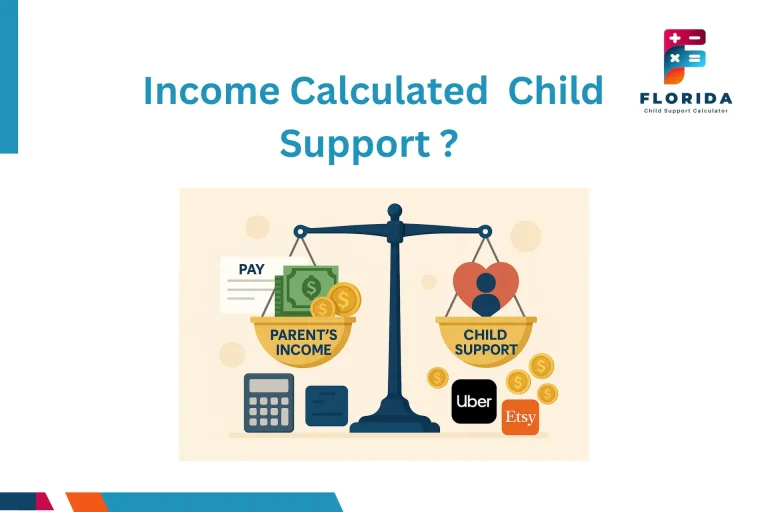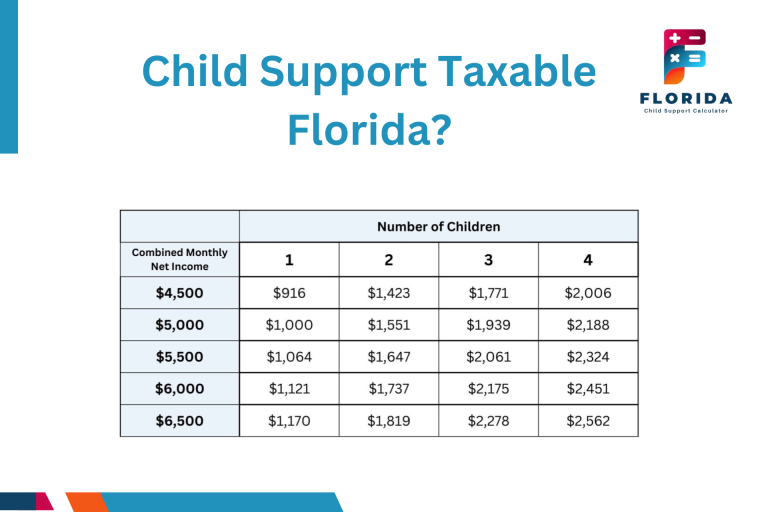How Is Income Calculated for Child Support in Florida?
How income is calculated for child support in Florida can feel confusing, but it’s simpler than you think. If you make money from a job, a side hustle, or even selling things online, the court wants to know about it.
They check everything, from your paychecks to apps like Venmo and PayPal, to make sure your income is calculated correctly for child support. In 2025, even crypto and gig work are part of the story! Think of it like building a pizza: every slice of money you earn goes into the total pie.
In this guide, we’ll break it all down with easy examples, simple words, and a few laughs along the way. Let’s get started.

What Counts as Income for Child Support in Florida?
When it comes to child support in Florida, almost everything you earn matters. It’s not just your 9-to-5 paycheck. It’s the weekend Uber rides. The Etsy shop. Even that Bitcoin you flipped last month! Here’s what Florida courts count as income:
- Wages and salaries
- Tips, bonuses, and commissions
- Business profits (after costs)
- Rental income from properties
- Dividends, stocks, and investment money
- Retirement and disability benefits
- Gig economy earnings (Uber, DoorDash, Etsy)
- Regular profits from crypto or NFT sales
Imagine your income like a backpack. The court wants to look inside and count every item you packed, big, small, shiny, or wrinkled. No hiding a sandwich at the bottom!
Gross Income vs Net Income: What the Court Looks At
Now, you might be thinking, “Do they count the money before or after taxes?” Good question! Florida courts start with your gross income, that’s the full amount you earn before taxes, insurance, or anything else gets taken out. Not what hits your bank account. Here’s a quick way to remember:
- Gross income: The whole pizza
- Net income: Just a slice or two after everyone else (like Uncle Sam) grabbed a piece
Courts want the whole pizza when figuring out how your income is calculated for child support payments. Later, they allow certain deductions, but they don’t start small. They start big.
Are Side Hustles and Gig Economy Jobs Included?
If you thought your weekend DoorDash runs or late-night Etsy orders didn’t count, buckle up! In Florida, side hustles are real income, and they matter for child support. Courts are getting smarter, too. They check gig apps, 1099 tax forms, even PayPal and Venmo deposits. If you earn $500 a month selling homemade candles or $300 a month driving for Uber, that money adds to your total. Here’s an easy way to think about it:
- If it pays you, it counts.
No matter if you work in an office, from your car, or while wearing pajamas at home, income is income. Florida courts are looking for the full picture, not just the fancy frame.
How Bonuses, Overtime, and Commissions Are Calculated
Bonuses feel like getting extra sprinkles on your ice cream. But guess what? Florida courts see those sprinkles, and they count them for child support. Here’s how it works:
- If your bonus or overtime is regular (like every year or every month), the courts average it over 12 months.
- If it’s a one-time thing (like a random “thank you” bonus), it might not have a big impact.
Same thing with commissions. If you sell houses, cars, or anything else and get a commission check, that’s income too.
Quick tip:
If you’re making extra money, courts expect you to share some of those sprinkles with your child, not just pile them on your own cone!
Cryptocurrency and NFT Earnings: The New Rules (2025 Update)
Back in the old days (okay, like five years ago), courts didn’t think much about Bitcoin or NFTs. Now? They’re watching them like hawks. If you trade crypto or sell NFTs for a profit in 2025, Florida courts want you to report it.
- Regular crypto profits: income
- NFT flips: income
Even if you try to hide it in a digital wallet, judges can ask for your Coinbase, Binance, or Metamask records. They can track your trades faster than you can say “blockchain.” Think of crypto like treasure you buried in the backyard. Just because you hid it doesn’t mean it isn’t real. The court will bring a shovel!
What Deductions Are Allowed from Income?
| Section | Details |
|---|---|
| Introduction | Why Deductions Matter |
| Allowed Deductions | Federal Income Taxes Medicare and Social Security Taxes Mandatory Union Dues Health Insurance Premiums (Parent + Child) Court-Ordered Support for Other Children -Childcare Costs (Work-Related) |
| Common Mistakes About Deductions | Mortgage payments are not deductible Car loans, Netflix, and gym memberships do not reduce income |
| Easy Way to Remember | The “Coupon Rule” only accepts certain deductions are accepted |
| Quick Tip Before Filing | Always double-check your allowed deductions before submitting your documents |
What Is Imputed Income and Why Does It Matter
Imagine if you could just quit your job and pay less child support. Sounds sneaky, right? Florida courts thought so, too; that’s why they have something called imputed income.
If you don’t work, or you work less on purpose, the court can pretend you’re still making money.
They look at your past jobs, your education, and local wages. Then they say, “You should be earning $50,000 a year,” even if you’re chilling on the couch.
Real-life example:
If you used to earn $25/hour but now you’re working part-time for $10/hour just before your court date, the judge might still calculate your support based on the $25/hour rate. You can’t just hide under a blanket and hope they won’t notice. Florida courts are good at peekaboo!
How Rental and Investment Income Affect Child Support
Got a house you rent out? Stocks that pay you money? Congratulations, but you can’t keep it a secret from the court. Florida counts rental income and investment profits as part of your child support calculation.
- For rentals, they look at what you earn after paying expenses like taxes and repairs.
- For stocks, dividends, and other investments, they add whatever money you pocket.
Quick illustration:
Think of rental income like a lemonade stand. You sell the lemonade (rent the house), pay for lemons and sugar (expenses), and what’s left is your income. Courts want that sweet leftover lemonade!
What Happens If You Hide or Underreport Income?
Trying to hide money from the court? That’s like trying to hide a neon sign in the dark, it won’t work.
| Section | Details |
|---|---|
| What Courts Can Do | Subpoena your bank records Check PayPal, Venmo, and Cash App deposits Demand tax returns and gig economy income reports Bring in forensic accountants (“money detectives”) |
| Big Risks You Face | Owing back payments with interest Paying the other parent’s legal fees Being punished for contempt of court |
| Bottom Line | Hiding income digs a bigger hole , and Florida judges are experts at handing you the shovel! |
How Shared Custody Affects Child Support Calculations
You might think that if you split time with your child 50/50, nobody pays child support. But in Florida, it’s not that simple. Even with shared custody, the court still checks:
- How much money each parent makes
- How many overnights does he child spend with each parent
- Who pays for things like school supplies, clothes, and doctor visits
Example:
If you have your child 60% of the time and your ex has them 40%, you might still get child support, especially if you earn less. Think of shared custody like a teeter-totter. It’s not just about time, it’s about balancing money too!
How to Modify Child Support if Your Income Changes
Life changes. You lose a job, get a promotion, or even move across the state. Good news: Florida lets you modify your child support if your income takes a big swing. Here’s when you can ask for a change:
- Lost your job
- Got a new, higher-paying job
- Became sick or disabled
- Big increase in expenses (like healthcare for the child)
But you can’t just shake hands with your ex and agree to pay less. You must file a formal request with the court. Think of it like updating your GPS when the road changes. If you don’t, you’ll keep driving the wrong way and paying the wrong amount.
FAQs About How Income Is Calculated for Child Support in Florida
Many people wonder about how their income is calculated when dealing with child support in Florida, and we’re here to clear it up.
Q: Do cash tips count as income?
A: Yes! Even if you’re a bartender stacking dollar bills, those tips count.
Q: Will courts check my PayPal or Venmo?
A: Absolutely. Digital payments are like open books now.
Q: Can I hide crypto income?
A: Not smart! Courts can demand your crypto wallets and tax forms.
Q: Does rental income always count?
A: Yes, after you subtract real expenses like repairs and taxes.
Q: How fast can I modify child support?
A: Usually a few months after filing, but the sooner you act, the better.
Florida courts are like detectives. If you’re earning, spending, or trading, they’ll find the trail. Honesty is your best shortcut.
Final Thoughts: Don’t Play Hide and Seek with Income
Here’s the simple truth: Florida courts take child support very seriously, and they’re getting smarter every year. If you make money, even from side gigs, crypto, or weekend hustles, it counts.
Think of your income like a giant flashlight. No matter how much you try to hide it, the court will find it shining in the dark. Being honest isn’t just smart, it’s about giving your child the life they deserve. Skipping out or hiding cash only leads to bigger problems later, like fines, court battles, and stress.
Bottom line? Treat your income like a full backpack. Pack it carefully, show everything you’re carrying, and walk proudly into court. Your child (and your peace of mind) are worth it.





